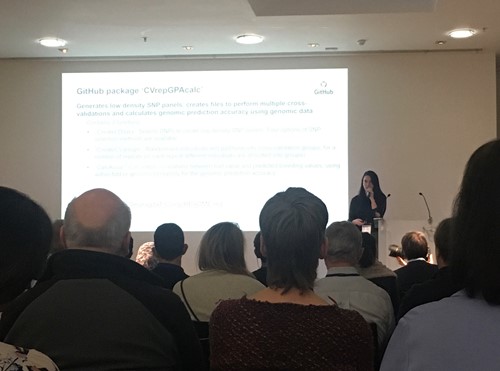Smaragda reports from ICISB 2019
Dr Smaragda Tsairidou is a Postdoctoral Research Fellow within the Division of Genetics and Genomics at the The Roslin Institute. SAIC sponsored her attendance at the fourth International Conference on Integrative Salmonid Biology (ICISB 2019) which took place at the Royal College of Surgeons, in Edinburgh, 17-20 November. Here is her report:
The meeting was a very high-profile event, with 172 international delegates from numerous countries including the UK, Norway, Canada, Chile, USA and Australia. The event was sponsored by the International Cooperation to Sequence the Atlantic salmon genome, the Scottish Aquaculture Innovation Centre, and Benchmark Genetics.
This four-day scientific meeting brought together academia and industry, and featured seven session themes: “Genome resources and evolution of salmonids”, “Functional genomics and annotation”, “Advances in precision breeding”, “Environment, ecology and conservation”, “Industrial perspectives”, “Physiology and nutrition”, and, “Immunology, disease and host-pathogen interactions”. Highly esteemed international speakers presented state-of-the-art advances in understanding the biology of salmonids, unravelling their genome and developing strategies for sustainable aquaculture production.
While attending the conference, I learned about the historic timeline of rediploidization events in salmonids and the complex effects of chromosomal re-arrangements. Several speakers referred to the regulation of gene expression either regarding the role of gene duplicates, or in the context of detecting patterns of DNA methylation and epigenomic effects on fitness. This can be pertinent for designing advanced breeding programmes, as there might be scope for future selective breeding to directly capitalise on epigenetic variation.
Several talks focused on the detection of selective sweeps, signatures of selection, and non-parallel evolution in salmonids. Improving our understanding of the long-term effects of artificial and natural selection can help us shed light on the genetic diversity observed today, and design robust breeding, feeding and management strategies to address future challenges arising from changing environmental conditions and market demands. Several presentations discussed the importance of thermoregulation and the effects of water temperature and salinity on immune response and cardiovascular capacity in salmonids. Understanding such physiological effects becomes increasingly important in the face of climate change.


Presenting my research about optimising cost-effective genomic selection for resistance to sea lice in Atlantic salmon in front of an international audience was a valuable experience, and attending this meeting was an excellent opportunity for exchanging ideas with other members of the aquaculture community, which will help me broaden the scope of my future projects. For example, genome editing technologies were presented, that can help us improve our understanding of many biological pathways. This is directly relevant to my current research funded by SAIC, as incorporating information on the functional role of genes into genomic selection may allow enhancing the genomic selection accuracy. In this respect, the final day of the conference was dedicated to the international cooperation on Functional Annotation of All Salmonid Genomes (FAASG). In addition, an “industrial perspectives” session highlighted the importance of research and innovation for ensuring sustainable aquaculture, and the major potential of genomic selection in salmonid breeding programmes for improving traits of economic importance, including disease resistance. Also including poster sessions and a vibrant social programme, the meeting provided a great opportunity to network with eminent researchers, industry representatives and funders, and to build international research collaborations.
Find out more about ICISB 2019Share this